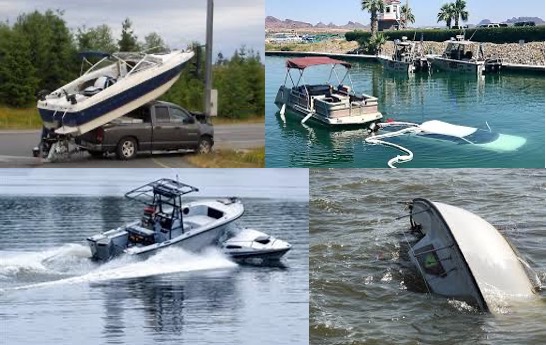B.1 Public Education - Boat America Course
Every year, hundreds of lives are lost and thousands of people are injured as a result of preventable boating accidents.
 If you have ever owned a boat, you probably discussed 1st year boat stories with fellow boaters. While they are very funny in the future, they are very painful when they occur. So we encourage you to learn from other people's mistakes and limit your own experiences.
If you have ever owned a boat, you probably discussed 1st year boat stories with fellow boaters. While they are very funny in the future, they are very painful when they occur. So we encourage you to learn from other people's mistakes and limit your own experiences.
Don't let something like this happen to you.
 Boating Safety is our most popular and most important class for Florida boaters. Florida law mandates that anyone born after January 1, 1988 must have a Safe Boater ID to operate a boat.
Boating Safety is our most popular and most important class for Florida boaters. Florida law mandates that anyone born after January 1, 1988 must have a Safe Boater ID to operate a boat.
TOPICS INCLUDE
- Introduction to Boating – Types of power boats; sailboats; outboards; paddle boats; houseboats; different uses of boats; various power boating engines; jet drives; family boating basics.
- Boating Law – Boat registration; boating regulations; hull identification number; required safety equipment; operating safely and reporting accidents; protecting the marine environment; Federal boating law; state boating laws; personal watercraft requirements.
- Safety Equipment – Personal flotation devices ("life jackets"); fire extinguishers; sound-producing devices; visual distress signals; dock lines and rope; first aid kit; anchors and anchor lines; other boating safety equipment.
- Safe Boating – Bow riding; alcohol and drug abuse; entering, loading, and trimming a boat; fueling portable and permanent tanks; steering with a tiller and a wheel; docking, undocking and mooring; knots; filing a float plan; checking equipment, fuel, weather and tides; using charts; choosing and using an anchor; safe PWC handling; general water safety.
- Navigation – The U.S. Aids to Navigation system; types of buoys and beacons; navigation rules (sometimes referred to as right-of-way rules); avoiding collisions; sound signals; PWC "tunnel vision."
- Boating Problems – Hypothermia; boating accidents and rescues; man overboard recovery; capsizing; running aground; river hazards; strainers: emergency radio calls; engine problems; equipment failures; carbon monoxide (CO); other boating and PWC problems.
- Trailering, Storing and Protecting Your Boat – Types of trailers; trailer brakes, lights, hitches, tires, and bearings; loading, balancing, and towing a trailer; towing (and backing) a trailer; boat launching and retrieving; boat storage and theft protection; launching, retrieving and storing a PWC.
- Hunting and Fishing, Water-skiing and River Boating – Carrying hunting gear and weapons in a boat; fishing from a boat; water-skiing safety guidelines and hand signals; water-skiing with a PWC; navigating rivers, and other boating tips.
The dates for Boating Safety classes:
LINK TO: FIND A BOATING SAFETY COURSE
LINK TO: REGISTER FOR A CLASS